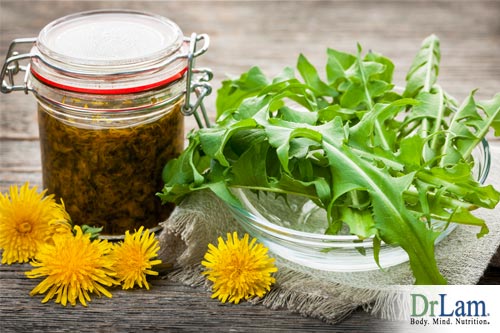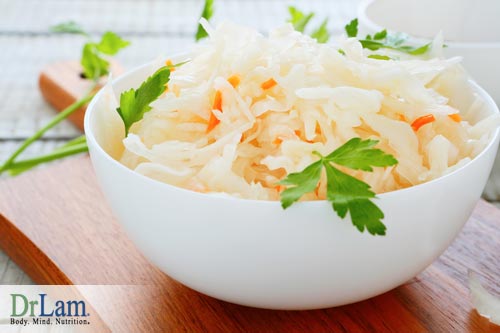 What is fermentation? Herbs have been added to foods to round out their flavors for thousands of years, and just like the process of fermentation, they also have some fascinating health benefits. They contain antioxidants, essential oils that have antimicrobial and anti-inflammatory properties, vitamins, phytosterols, and other unique compounds, which can have positive effects on various diseases. Herbs can play a significant role in a treatment plan for Adrenal Fatigue sufferers, as they can be considered when nutrients such as magnesium, vitamin B and other trace minerals have failed to bring about complete recovery, or in other special situations, such as where an individual may have adverse reactions to the supplements.
What is fermentation? Herbs have been added to foods to round out their flavors for thousands of years, and just like the process of fermentation, they also have some fascinating health benefits. They contain antioxidants, essential oils that have antimicrobial and anti-inflammatory properties, vitamins, phytosterols, and other unique compounds, which can have positive effects on various diseases. Herbs can play a significant role in a treatment plan for Adrenal Fatigue sufferers, as they can be considered when nutrients such as magnesium, vitamin B and other trace minerals have failed to bring about complete recovery, or in other special situations, such as where an individual may have adverse reactions to the supplements.
Let us briefly consider a few of the more well-known herbs, such as:
What is fermentation is a common question. The fermentation of foods is an ancient practice that is known to many cultures throughout the world. Our ancestors fermented food for various reasons, ranging from food preservation coming off an abundant summer harvest to last throughout the winter months, to improving the taste and quality of the food. Each region of the world has its own unique fermented cuisine that is a staple in that particular culture, for example, in Asia, foods such as miso, tempeh, kim chi, tamari, and fermented fish sauce are in common use; Europe has sourdough, yogurt, sauerkraut, and American traditions include pickles and relishes, to name just a few.
During the fermentation process, an agent (usually bacteria and yeast) reacts with an organic substance to break it down into simpler substances. Fermentation is employed in the leavening of bread, and for preservation techniques to create lactic acid in sour foods such as sauerkraut, dry sausages, kim chi and yogurt, or vinegar (acetic acid). Generally speaking, the longer a food product is left to ferment, the greater the health/medicinal benefits.
Take for example the double fermentation process of apple cider vinegar. Initially, the apples are pressed to create juice, which is fermented into cider. In the second fermentation, the cider turns into alcohol, which in turn becomes acetic acid, the preliminary compound of vinegar. This double fermentation not only retains all the nutritional benefits of the apples but has also created a myriad of new beneficial acids and enzymes.
Fermented foods were once consumed in greater quantities in everyday households. Modern day methods of food preparation, however, have supplanted this age-old practice due to an emphasis on convenience and the mass production of food items. While bread was traditionally made using wild yeast that was caught from the atmosphere to create sourdough necessary for the leavening of bread, modern methods now favor instant yeast that speeds up the bread making process.  However, this fundamentally changes the nutritional value of the end product. Sauerkraut and other pickled foods were once cultured by being left out on the shelves at room temperature to naturally ferment using salt or whey, but now these food items undergo a fundamentally different process replacing natural fermentation with a combination of vinegar and preservatives to achieve the same acidic pickled flavor, however lacking the beneficial byproducts of fermentation.
However, this fundamentally changes the nutritional value of the end product. Sauerkraut and other pickled foods were once cultured by being left out on the shelves at room temperature to naturally ferment using salt or whey, but now these food items undergo a fundamentally different process replacing natural fermentation with a combination of vinegar and preservatives to achieve the same acidic pickled flavor, however lacking the beneficial byproducts of fermentation.
Another ancient method of fermentation that is now regaining popularity is kefir-fermented beverages. Kefir is a cultured and microbial rich food that helps to restore the balance of bacteria in our gastrointestinal tract (GI). It contains strains of beneficial yeast and bacteria in a symbiotic relationship that gives kefir its antibiotic properties. Increasing in popularity amongst health-conscious consumers, kefir is now widely available in two different kinds; milk kefir and water kefir. Both are similar in that they are probiotic rich beverages, however, water kefir is dairy free, making it a great choice for vegans and those with dairy sensitivities.
The complex process of digestion begins as soon as food enters the mouth and then the stomach, whereby beneficial, harmful and neutral microbes coexist in the gastrointestinal tract (GI) to complete the digestive process. A healthy intestinal track is of paramount importance because the majority of our immune system is in our gut, most notably the beneficial bacteria that live symbiotically within the GI tract and fight off the harmful bacteria.
Certain intestinal microbes create organic acids (lactic and acetic acids) that tend to lower the pH of the intestinal contents. Along the GI tract, there is a large mucosal surface, where microbes and foreign antigens are present that interact with important components of the immune system, which serves to stimulate the immune system. A healthy GI tract would have thick intestinal lining or villi, and the enterocytes are properly attached to each other, thereby decreasing the passage of bacteria or antigens from the intestine into the bloodstream (this is also known as leaky gut). The shorter the length of the intestinal villi, the less nutrients the body is able to absorb, which can lead to malnutrition, and other digestive issues. This, in turn, can create a body that is less able to fight against infections, which can lead to villi destruction. This is a vicious cycle that can be disrupted with the consumption of fermented foods, in particular herbs, which seek to rebuild the GI tract through increased solubility and bioavailability of healing nutrients to assist with digestion and GI healing.
 Exploring what is fermentation is an interesting topic. Optimal intestinal health is critical to optimum health, as dysfunctional digestive issues can crop up subclinically and wreak havoc on the body as a sign prior to clinical onset of many chronic diseases. One of the most powerful and gentle tools available for healing and strengthening the gastrointestinal tract are fermented foods—and not just any foods, but herbs, which are powerhouses of nutrition and healing.
Exploring what is fermentation is an interesting topic. Optimal intestinal health is critical to optimum health, as dysfunctional digestive issues can crop up subclinically and wreak havoc on the body as a sign prior to clinical onset of many chronic diseases. One of the most powerful and gentle tools available for healing and strengthening the gastrointestinal tract are fermented foods—and not just any foods, but herbs, which are powerhouses of nutrition and healing.
Many people ask what is fermentation and why are fermented herbs so beneficial. When the unique medicinal properties of herbs are combined with the nutritional benefits of the fermentation process what results is an unlocking of additional potent healing properties that remain untapped if the herb is consumed in its natural state. These health benefits are made possible through the biotransformation of the herbs by fermenting agents, which results in herbal nutrients being more easily broken down (solubility) and more readily absorbed by the body (bioavailability). An example of this is the fermentation of herbs with kefir grains, as these grains contain beneficial yeast and bacteria that work together in a symbiotic relationship to separate out the sugars from the beneficial molecules contained in herbs. When the sugars present within the molecular structure of herbs are removed, the healing elements of the herb are heightened in their solubility and bioavailability within the body resulting in numerous health benefits such as: improved digestion and assimilation of nutrients, healthy metabolism, detoxification, increased vitality, improved energy and mood, a healthier inflammatory response, and balanced pH levels. These improvements in health are attributed to the following processes that occur when fermenting herbs:
 Fermentation of herbs results in an increase in specific micronutrients such as amino acids, which comprise the building blocks of bodily protein. An increase of amino acids acts as an increase of fuel supply for the body through the decomposition of the nutrients contained in fermented herbs, and their transformation into more bioavailable organic compounds.
Fermentation of herbs results in an increase in specific micronutrients such as amino acids, which comprise the building blocks of bodily protein. An increase of amino acids acts as an increase of fuel supply for the body through the decomposition of the nutrients contained in fermented herbs, and their transformation into more bioavailable organic compounds.
Fermentation promotes digestion and absorption of nutrients as the fermentation process breaks down the food into its more basic constituents making the food more readily absorbed by the body. This process, briefly mentioned above, is demonstrated within the fermentation of herbs using kefir grains when the sugar moiety of the herb is separated from its nutrients.
Most of the beneficial molecules in plants are linked to a sugar moiety that must be removed before proper absorption; our bodies prior to the fermentation process poorly absorb these soluble glycoside phytocompounds and trace minerals. Without this separation process, these soluble glycoside phytocompounds and trace minerals remain and burden our digestive system. In using fermentation, however, the sugar is separated and biotransformed into aglycone molecules (now in gluconate and/or acetate form) which are water-soluble and more readily absorbed by the body. The kefir grains (a combination of yeast and bacteria) consume the sugar moiety and create new metabolites such as organic acids, B vitamins, amino acids, enzymes and other beneficial yeast and bacteria.
Fermented herbs and foods have been known to restore the proper balance of bacteria in the GI, as many modern day ailments (for example, leaky gut syndrome, gluten intolerance, allergies, etc.) have been linked to a poor presence of good bacteria in the GI. Raw, fermented foods are rich in probiotics, enzymes, antioxidants, vitamins, organic acids, and minerals that all promote the presence of good bacteria in the GI. The process of fermentation not only preserves the initial food product prior to fermentation, but it also creates a multitude of new beneficial compounds during the fermentation process.
As the body ages its supply of enzymes deteriorates and there is a greater need for enzymes to aid in the digestion and absorption of food. Poor adrenal function is often associated with an inability to digest food as compared to an optimally functioning digestive system, and also low gastric acidity.
Enzymes are destroyed when heated, so to preserve a food using the fermentation process as opposed to pasteurization, not only keeps the enzymes alive in the original food product, but also creates new enzymes that are medicinally beneficial. The process of fermentation does not require heat or alcohol, preserving a greater amount of the beneficial enzymes that make herbs a unique whole food matrix.
Probiotics (the literal meaning is for life) are live microbial cultures that are beneficial to the consumer in improving GI tract health, the immune system, and synthesizing and enhancing the bioavailability of nutrients. Most probiotics fall into the group of organisms known as lactic acid-producing bacteria and are normally consumed in fermented foods. The exact science in which probiotics exert their effects are largely unknown, however, scientific evidence has revealed that they play an important role in a healthy diet, in health maintenance and in disease prevention. Probiotics help to maintain the balance of bacteria in the GI tract and immune system.
Probiotics requires prebiotics, which are non-digestible carbohydrates that nourishes the good bacteria already in the colon. When probiotics and prebiotics are combined, they form a symbiotic. Kefir and yogurt are symbiotic because they contain the prebiotic, the fuel, and the probiotic, the live bacteria.
Herbal remedies offer an alternative and natural approach to conventional medicine, in situations where a pharmacological approach could result in unwanted toxic build up in the body causing further damage. This is particularly so in cases involving the liver. Herbs such as milk thistle, turmeric, dandelion and globe artichoke can play an important role in support of self-healing liver cells. Furthermore, the formation of toxins in the body may be caused by indigestion problems such as constipation in which microbial activities produce toxins after prolonged retention of food components in the bowel.
 As compared to regular herbs, fermented herbs have the added benefit of speeding up proper digestion and waste elimination, therefore, lessening the time toxins are present in the GI tract. Probiotics in the fermented herbs once consumed assists in the building up of good bacteria in the GI tract so that food is more easily broken down and nutrients are absorbed faster. This allows the body to complete the digestive process quickly and efficiently, which appreciably assists with not only improving the mobility of the GI tract but also helps in detoxifying heavy metals from the body.
As compared to regular herbs, fermented herbs have the added benefit of speeding up proper digestion and waste elimination, therefore, lessening the time toxins are present in the GI tract. Probiotics in the fermented herbs once consumed assists in the building up of good bacteria in the GI tract so that food is more easily broken down and nutrients are absorbed faster. This allows the body to complete the digestive process quickly and efficiently, which appreciably assists with not only improving the mobility of the GI tract but also helps in detoxifying heavy metals from the body.
Significantly, liver congestion is linked to most chronic illnesses because the liver influences the function of all body cells. For instance, it promotes the production of amino acids, which are used in the production of cellular proteins and hormones. Therefore, impairment of liver functioning causes physiological imbalances in the body leading to the feeling of tiredness, which is also a principal characteristic of AFS. It is believed that liver congestion is linked to AFS because it can lead to hormonal and lipid imbalance in the body. However, liver congestion and AFS are best addressed using alternative medical approaches, as conventional medical approaches do not recognize the condition yet. Some of the most reliable herbs that can assist in liver congestion include dandelion, turmeric, and globe artichoke.
Herbal remedies can present a distinct advantage over conventional medicines, as their consumption does not result in the fast accumulation of toxic byproducts in the body. This is a distinct advantage when combating chronic diseases, where conventional medical approaches call for drugs that target specific symptoms/bio-markers while also leaving behind toxins for the liver to clear and process. Over time, the level of toxic compounds can become too great, resulting in liver toxicity and congestion either clinically or subclinically.
It is important to realize that while most herbs are beneficial for general well being and those with mild AFS, those with advanced adrenal fatigue are in a unique category, as certain herbs can be beneficial for recovery from AFS, while other herbs can be quite detrimental and delay or prevent healing. Herbs that are commonly used in mild AFS that can potentially backfire when the person is in advanced stages includes rhodiola, licorice, ashwagandha, maca, green tea, and ginseng. Also, although herbs are widely used for adrenal healing, due to the lack of standardization and research, information about them is often incorrect, which tends to lead to their misuse. Proper guidance from someone experienced with healing the adrenals is needed in order to avoid the pitfalls and side effects. Inappropriate usage could trigger adrenal crashes.
Fermented herbs can be a key to AFS recovery. The more advanced the AFS, the more beneficial this can be if used properly. In addition to traditional herbal formulas that are useful in supporting adrenal and liver function, fermented herbs offer an additional dimension to the healing process by allowing faster assimilation of the herb from the GI tract into the blood stream, making use of its bioavailability across the cellular membrane at the orthomolecular level. Almost any herb will find an increase in potency as a result of this fermentation if the delivery system is properly titrated. This is especially critical for those in advanced AFS where the body is highly sensitive to any supplementation and paradoxical reactions are common. Proper dosage is key because too much of a good thing can actually backfire in the case of AFS, especially when the sufferer is in the advanced stages where a paradoxical reaction is common. At the same time, though previously incapable under normal circumstances, proper dosage may allow important nutrients to reach the cells. Liver congestion, GI motility slowdown, and irritable bowel syndrome are some intervening factors that need to be considered in the overall picture.
 Symptoms that benefit greatly from proper use of fermented herbs in the AFS setting include brain fog, liver congestion, supplement sensitivity, multiple chemical sensitivity, delayed food sensitivity, inflammatory response, anxiety, sluggishness, fatigue, nervousness, sleep onset insomnia, sleep maintenance insomnia, joint pain, and many others.
Symptoms that benefit greatly from proper use of fermented herbs in the AFS setting include brain fog, liver congestion, supplement sensitivity, multiple chemical sensitivity, delayed food sensitivity, inflammatory response, anxiety, sluggishness, fatigue, nervousness, sleep onset insomnia, sleep maintenance insomnia, joint pain, and many others.
The key to successful use of fermented herbs in the AFS setting lies in knowing the body's unique constitution and matching it with the proper dosage and delivery system of fermented herbs. For optimum results, both regular and fermented herbs can be used concurrently. The key again is proper dosage. Used correctly, this can be an invaluable tool in the overall AFS recovery process.
When a herb is fermented, the process helps to make the herb become more bioavailable for the body. Milk thistle is known to help improve liver function.
The fermentation process breaks down nutrients into minute pieces, so they are better assimulated.
"Thank you for your great website"
"Thank you for your great website. It has a wonderful amount of information and very readable and organized."